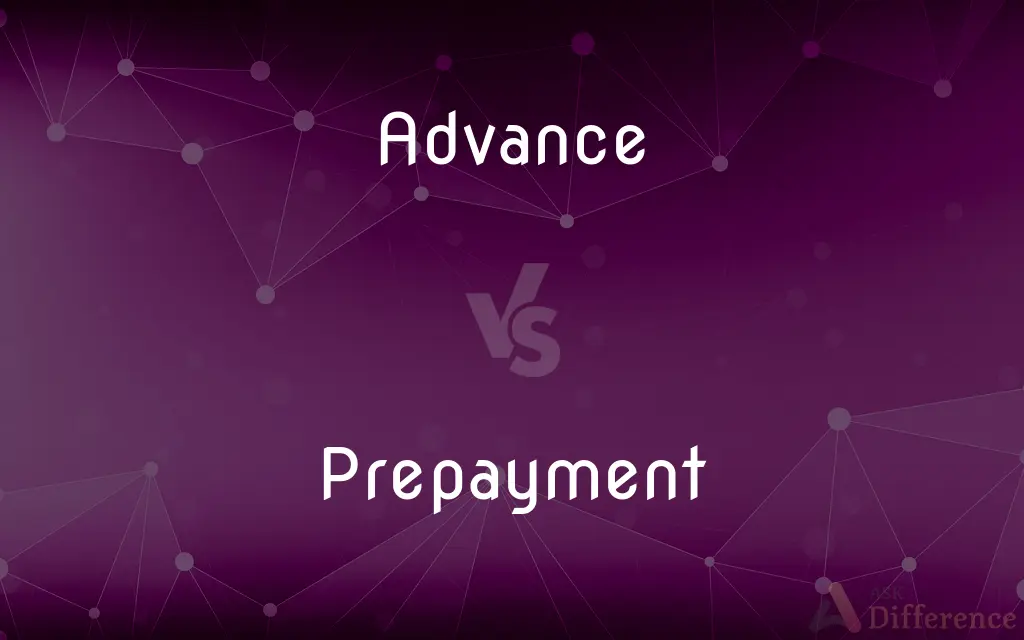Advance vs. Prepayment — What's the Difference?
Edited by Tayyaba Rehman — By Maham Liaqat — Updated on February 28, 2024
Advance refers to funds provided before a service or product is delivered, emphasizing the timing, while prepayment is the act of paying for something ahead of its due date, focusing on the payment aspect.

Difference Between Advance and Prepayment
Table of Contents
ADVERTISEMENT
Key Differences
An advance is typically a payment made before the completion of a service or delivery of a product. It's often used in contexts where the payment acts as a security or confirmation of an upcoming transaction. Prepayment, on the other hand, specifically refers to paying for goods, services, or debts before they are due or delivered.
This term advance highlights the forward movement of funds in anticipation of a future exchange. Prepayment, on the other hand, specifically refers to paying for goods, services, or debts before they are due or delivered.
The concept of an advance can also imply a financial support or loan that is to be repaid or accounted for upon the fulfillment of an agreement. It's not solely about paying early but providing funds based on trust and anticipation of a service or product.
Prepayment is commonly used in financial transactions, such as mortgage payments, subscriptions, or insurance, where paying ahead of schedule can lead to benefits like interest savings or securing a favorable rate or position.
Both involve early payment, an advance might require reconciliation or adjustment upon final delivery of goods or services, reflecting its nature as a part of an ongoing transaction. Prepayment, by contrast, often settles the obligation in full, with no expectation of further adjustments related to that particular payment.
ADVERTISEMENT
Comparison Chart
Definition
Funds provided before a service or product is delivered.
Paying for something ahead of its due date.
Focus
Timing and anticipation of future exchange.
Act of settling a payment early.
Context
Security or confirmation of a transaction.
Financial transactions, mortgages, subscriptions.
Financial Reconciliation
May require adjustment upon final delivery.
Often settles the obligation in full.
Benefits
Secures a service/product, confirms intent.
Can lead to interest savings, secures rates/positions.
Compare with Definitions
Advance
Early payment as a sign of good faith.
She paid an advance to confirm her reservation.
Prepayment
Advance payment to secure a benefit.
Prepayment secured his spot in the exclusive seminar.
Advance
Funds given ahead of a product delivery.
The advance helped secure the production materials needed.
Prepayment
Paying for goods before receiving them.
Prepayment was required for the custom order.
Advance
Financial support provided with expectation of future settlement.
The publisher gave an advance against future book sales.
Prepayment
Early payment to clear a debt.
Prepayment of the loan eliminated future interest charges.
Advance
Loan given on the anticipation of repayment.
The advance was to be deducted from his next paycheck.
Prepayment
Paying a bill before its due date.
She made a prepayment on her mortgage to reduce the interest.
Advance
A payment made before services are rendered.
He received an advance on his salary to cover urgent expenses.
Prepayment
Settling a subscription fee upfront.
Annual prepayment for the service earned him a discount.
Advance
Move forwards in a purposeful way
The troops advanced on the capital
He advanced towards the dispatch box
Prepayment
To pay or pay for beforehand.
Advance
Make or cause to make progress
Our knowledge is advancing all the time
It was a chance to advance his own interests
Prepayment
A payment in advance.
Advance
A forward movement
The rebels' advance on Madrid was well under way
The advance of civilization
Prepayment
(accounting) An asset recognized in respect an expense incurred in a period for which the benefit will be received in a future period.
Advance
A development or improvement
Decades of great scientific advance
Advances in engineering techniques
Prepayment
Payment in advance.
Advance
To put forward; propose or suggest
Advanced a novel theory during the seminar.
Advance
To bring forward; to move towards the van or front; to make to go on.
Advance
To move or go forward; to proceed; as, he advanced to greet me.
Advance
The act of advancing or moving forward or upward; progress.
Advance
Being ahead of time or need;
Gave advance warning
Was beforehand with her report
Advance
Situated ahead or going before;
An advance party
At that time the most advanced outpost was still east of the Rockies
Common Curiosities
Is an advance refundable?
Depends on the agreement; it can be refundable if conditions are not met.
Can advances be used in personal transactions?
Yes, for personal loans or agreements between individuals.
Is prepayment mandatory for some transactions?
Yes, in cases like custom orders or special service agreements.
Is prepayment beneficial for all parties?
Usually, it benefits the payee by securing funds early and the payer by securing goods/services or savings.
Are advances common in all industries?
Particularly common in publishing, construction, and freelance work.
Do all businesses accept prepayments?
Many do, especially if it improves cash flow or secures a sale.
Does prepayment always save money?
Often, especially with loans or subscriptions, due to reduced interest or discounted rates.
Can an advance be considered a loan?
Yes, especially if it's expected to be repaid or deducted from future earnings.
How does an advance affect accounting?
It's recorded as a liability until the service is rendered or product delivered.
Can prepayment affect a warranty or return policy?
Generally, no, but policies vary by vendor or service provider.
Are there penalties for prepayment?
Sometimes, especially with loans, there may be prepayment penalties.
How is an advance different from a deposit?
An advance is more about securing a service/product, while a deposit often serves as a security measure.
What's the risk of paying an advance?
The risk is the service/product not being delivered as agreed.
Why might someone choose prepayment over regular payments?
For savings, to secure a spot, or to eliminate a future liability.
What happens if a service for which an advance was paid is not delivered?
The advance may be refunded or credited, depending on the agreement.
Share Your Discovery

Previous Comparison
XFCE vs. GNOME
Next Comparison
Judgement vs. VerdictAuthor Spotlight
Written by
Maham LiaqatEdited by
Tayyaba RehmanTayyaba Rehman is a distinguished writer, currently serving as a primary contributor to askdifference.com. As a researcher in semantics and etymology, Tayyaba's passion for the complexity of languages and their distinctions has found a perfect home on the platform. Tayyaba delves into the intricacies of language, distinguishing between commonly confused words and phrases, thereby providing clarity for readers worldwide.
















































